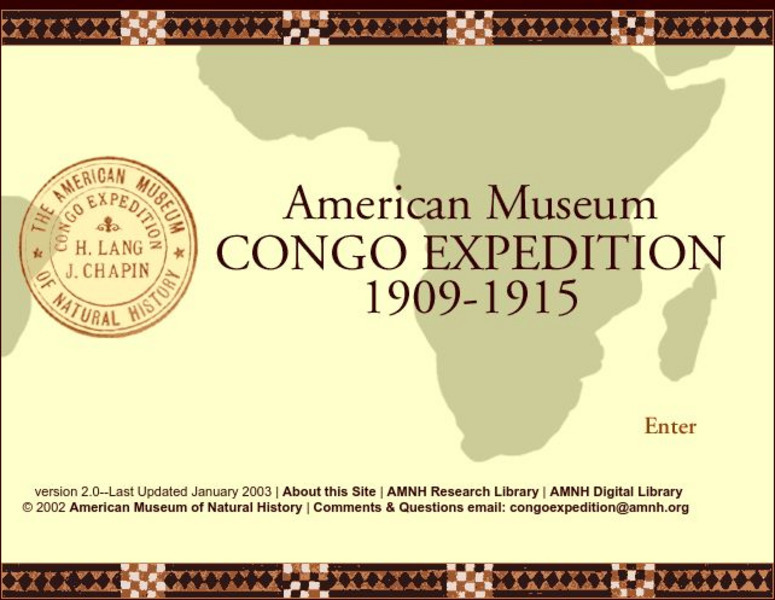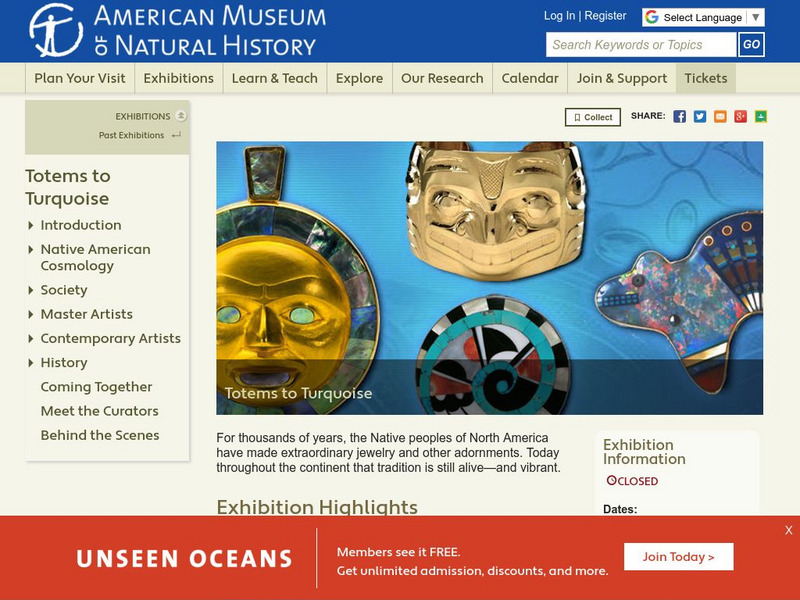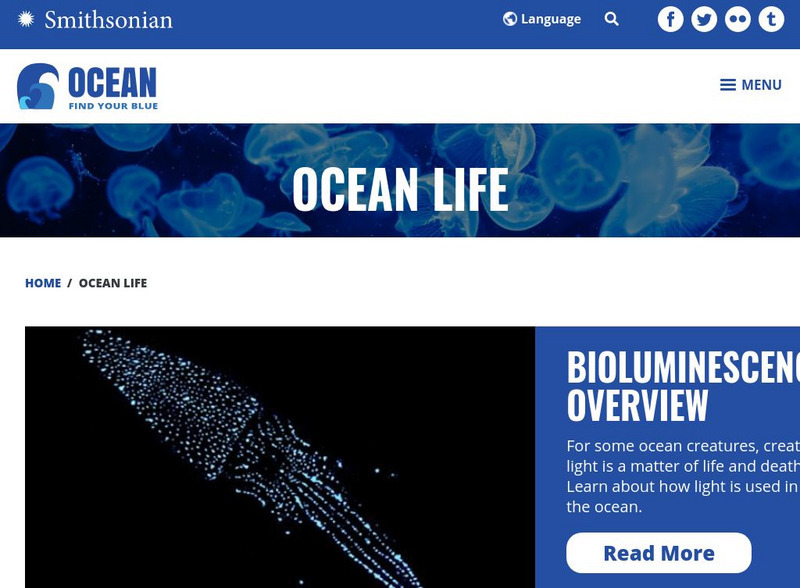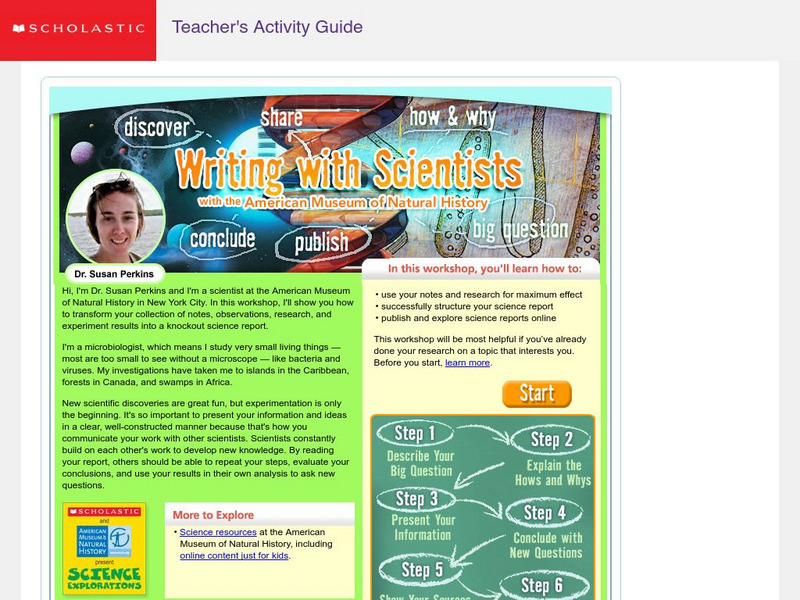Hi, what do you want to do?
American Museum of Natural History
American Museum of Natural History: Grow Rock Candy
Students can carry out an investigation using sugar and water to determine whether heating or cooling a substance may cause changes that can be observed. This activity reinforces the ideas that the properties of materials can change when...
American Museum of Natural History
American Museum of Natural History: Map Your World
Students can follow these easy steps to develop a model (drawing) of their room and the things in it. Then they can broaden the drawing to include their entire floor, apartment, or house.
American Museum of Natural History
American Museum of Natural History: Digital Library: Congo Expedition: 1909 15
A rich-media website that traces a major expedition into the Belgian Congo (the present-day Democratic Republic of the Congo) at the dawn of the twentieth century. Includes maps, diary entries, specimens, and recordings as well as a...
American Museum of Natural History
American Museum of Natural History: Totems to Turquoise: Native American Jewelry
Through this resource, the user can learn about the hand-crafted jewelry of Native North Americans of the Northwest and Southwest and how it embodies both the personal and collective identity of the maker and the wearer.
American Museum of Natural History
American Museum of Natural History: Ology: Paleontology: The Big Dig
A collection of online games, virtual puzzles, experiments, and interviews with experts to immerse students into the world of paleontology.
Smithsonian Institution
National Museum of Natural History: Ocean Portal, You Navigate
Delight in the fresh colors, sights, and sounds on this dynamic site on the ocean. Major categories consist of Ocean Life & Ecosystems, The Ocean Over Time, Ocean Science, and The Ocean and You. New information on sharks, a slideshow...
Smithsonian Institution
National Museum of Natural History: Ocean Portal: Ocean Life & Ecosystems
From the tiny to the titanic, from the familiar to the undiscovered, the ocean offers a stunning diversity of marine life and nearly every kind of habitat imaginable. Dive in and explore them here. Links incude stories, videos and photos...
Smithsonian Institution
National Museum of Natural History: Wildlife Portfolio
The Smithsonian Arctic Studies Center offers a portfolio of arctic animals. A page dedicated to each animal provides a physical description, personal observations of the animal in the wild, and several pictures.
Smithsonian Institution
National Museum of Natural History: Lewis and Clark Mapping the West
Understand the importance of the mapping done by Lewis and Clark as you work through these learning exercises and learn mapmaking skills yourself.
Smithsonian Institution
National Museum of Natural History: Global Volcanism Program: This Dynamic Planet
Interactive activity that allows the learner to make their own regional map using layers of their choice such as volcanoes, craters, plate tectonics, or earthquakes. This map of the Earth zooms in and out, highlights essential processes,...
American Museum of Natural History
American Museum of Natural History: Play With Color and Light
See what happens when you mix different colors of lights.
American Museum of Natural History
American Museum of Natural History: What Is Water?
This comprehensive article provides information about the physical properties of water, the importance of water as an Earth material, the processes and cycles that water undergoes on Earth, its importance to life on Earth, and why we...
American Museum of Natural History
American Museum of Natural History: Find My Plankton Baby Picture
By observing photos of plankton at different life stages, students can obtain information that will allow them to construct evidence-based accounts of how parents and offspring don't always look alike.
American Museum of Natural History
American Museum of Natural History: Make Your Own Weather Station
Students can plan and carry out investigations of local weather patterns by building their own weather stations to collect observations of various weather conditions: rainfall, wind direction, and air pressure.
University of Florida
Florida Museum of Natural History: Investigating Water
This guide engages children in the process of scientific inquiry using the context of a favorite early childhood pastime-water play.
American Museum of Natural History
American Museum of Natural History: O Logy: What's the Big Idea? Climate Change
What do people around the world need to do in order to slow the process of climate change? This resource dives into the dangers of change and proposes solutions.
Scholastic
Scholastic: Writing With Scientists With the American Museum of Natural History
Follow this six-step method and you'll have a good understanding of what a good scientific research paper involves and how it is organized. There are plenty of samples for you to look at. This explanation is also very helpful for...
American Museum of Natural History
American Museum of Natural History: Paleont O Logy: The Big Dig
This colorful and inviting resource houses tons of paleontology activities to explore. Play the Layers of Time puzzle game, create your own make-believe dig site by burying chicken bones in plaster of Paris, learn how to draw dinosaurs,...
Other
Santa Barbara Museum of Natural History: The Chumash People of California
A thorough look at the Chumash people of California. Read about their unique plank canoes, basketry, language, and cave paintings. Many pictures of artifacts and drawings accompany the information.
University of Florida
Florida Museum of Natural History: Plant Life
This teacher's guide focuses on the fascinating world of plants. Through books and other print materials, and exploration of actual plants, children will identify plants as living things, examine the parts of plants, experiment with what...
Smithsonian Institution
National Museum of American History: History Explorer
This website, developed by the National Museum of American History, provides standards-based online resources for teaching and learning American history. An array of teacher lessons, activities, interactive media, and artifacts tag this...
University of Florida
Florida Museum of Natural History: Kitchen Science
This guide focuses on everyday substances and how we can change their properties by adding heat or cold, physically manipulating them, or mixing them together.
University of Oxford (UK)
Oxford University Museum of Natural History: Seven Life Processes
Explore the seven life processes that describe whether an animal is alive or not. Each characteristic is defined with examples and pictures. Also included is a living animal quiz to test how much you have learned.
American Museum of Natural History
American Museum of Natural History: O Logy: Jade
A scientist from the American Museum of Natural History familiarizes viewers with jade, a rare stone from different places around the world. Explore the scrapbook he kept.



















